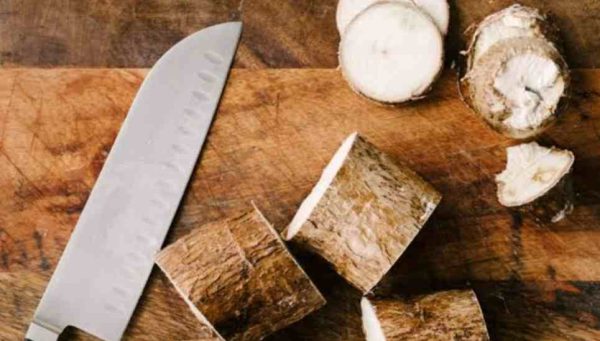Cassava is also called as Manihot esculenta. It is one such tropical root vegetable that can be poisonous or beneficial depending on how we consume it. Cassava can be used along with potatoes, carrots, radishes, and other tubers. Leaves of this veggie can be used to prepare food. The amazing part of this plant is that it can survive for very long in poor soil quality. There are two kinds of cassava plants one sweet and another bitter. Cassava can be beneficial if consumed in the right amount and in proper preparation.
Nutritional Value Of Cassava
100 g of raw cassava contains the following nutritional value
- Energy: 160 kcal
- Carbohydrates: 38.1 g
- Sugars: 1.7 g
- Dietary fiber: 1.8 g
- Fat: 0.3 g
- Protein: 1.4 g
- Vitamin B1: 8%
- Vitamin B2: 4%
- Vitamin B3: 6%
- Vitamin B6: 7%
- Folate B9: 7%
- Vitamin C: 25%
- Calcium: 16 mg
- Iron: 0.27 mg
- Magnesium: 21 mg
- Phosphorus: 27 mg
- Potassium: 271 mg
- Sodium: 14 mg
- Zinc: 0.34 mg
Health Benefits Of Cassava
1. Treat Rheumatic Diseases
Rheumatic diseases affect your joints tendons, ligaments, bones, and muscles. Some of its examples are arthritis, spondylitis, and osteoporosis. However, cassava leaves are rich in magnesium. A diet high in magnesium leads to lowered blood pressure levels that reduce the chances of rheumatic diseases.
2. Clear Up Worms
According to some solid research, cassava leaves reduce nematode infection in the GI tract. To consume cassava to eliminate worms. An individual can buy cassava supplements found in pharmacies. Else one can even make a paste of cassava leaves and eat that as a whole.
3. Prevent Headaches
Nowadays most of us suffer from headaches which sometimes are unbearable. Do you know that you can treat headaches with the help of cassava? Drinking fresh juice from cassava roots or leaves can help you out. All you just have to soak cassava leaves or roots in water for a few hours. Then make juice out of it. Make sure to soak cassava, as raw cassava contains naturally occurring forms of cyanide, which are toxic to ingest.
4. Strengthens Immunity
Vitamin C and folate present in cassava are very good for the body’s immune system. Folate support in the production of cells in our body. That help in making the genetic material for life and preventing DNA mutations. While vitamin C helps the immune system by attacking the nucleus of viruses and bacteria, rendering them dead. It is also a good antioxidant that eliminates free radicals in the body.
5. Serves As Energy Fuel
Cassava is a good source of carbohydrates. Consuming cooked cassava can be carb-loading and restores the spent energy. The complex carbohydrate chain ensures a consistent energy supply as well. However, it is good for an individual who is looking for a recovery meal after high-intensity exercises.
6. Support Weight Maintenance
Even though cassava is high in calories, it provides fiber and resistant starch that can promote healthy gut bacteria. According to research fiber from root vegetables reduces cravings for salty, sweet, and high-fat foods.
Adverse Effects
Cassava can be dangerous if consumed in large amounts, raw, or if prepared improperly. A raw cassava contains chemicals called cyanogenic glycosides. If consumed can release cyanide into your body. Continuous eating of cyanogenic glycosides or consuming them in high amounts increases the risk of cyanide poisoning. Soaking and cooking cassava decreases the content of these harmful chemicals. And also pairing the root vegetable with a well-rounded diet that’s high in protein can reduce the risk of adverse health outcomes.
